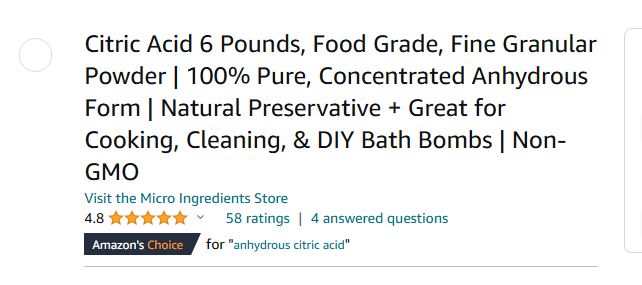Hi all,
I'm thinking about how best to passivate my stainless steel equipment. I have a new SS mashtun arriving soon, and I have lots of other stainless equipment that it has been a few years since i've passivated.
I thoroughly clean and sanitize my fermenter and boil kettle after each use, but I am feeling that it's time for a deep clean and passivation.
For the new mash tun, i will of course do a TSP wash and i'll follow that by a PBW wash, but then i'm wandering what acid to use for passivation.
I know that traditional homebrewer advice is to use StarSan at 1oz/gallon concentration, and I could do that, but star san is rather expensive. I'd rather reserve the Star San for sanitization and use something else for passivation.
I DO have plenty of 85% Phosphoric acid, and concentrated sulfuric acid, nitric acid, hydrochloric acid, and a few other acids. It would actually be fairly convenient for me to use one of those instead of my StarSan.
I would rather run a passivation cycle for longer time and higher concentration of acids than heating solutions up to high temperatures. I regularly work with strong acids, so i'm comfortable dealing with them and making solutions at precise concentrations.
Can anyone offer advice or resources outlining which acid at which concentration and time is best for passivating 304 stainless? I might just use 1oz of 85% H3PO4 per gallon and let it sit overnight and then air dry?
Hoping I can find a good industrial SOP where the science makes sense.
Thanks. Cheers.
I'm thinking about how best to passivate my stainless steel equipment. I have a new SS mashtun arriving soon, and I have lots of other stainless equipment that it has been a few years since i've passivated.
I thoroughly clean and sanitize my fermenter and boil kettle after each use, but I am feeling that it's time for a deep clean and passivation.
For the new mash tun, i will of course do a TSP wash and i'll follow that by a PBW wash, but then i'm wandering what acid to use for passivation.
I know that traditional homebrewer advice is to use StarSan at 1oz/gallon concentration, and I could do that, but star san is rather expensive. I'd rather reserve the Star San for sanitization and use something else for passivation.
I DO have plenty of 85% Phosphoric acid, and concentrated sulfuric acid, nitric acid, hydrochloric acid, and a few other acids. It would actually be fairly convenient for me to use one of those instead of my StarSan.
I would rather run a passivation cycle for longer time and higher concentration of acids than heating solutions up to high temperatures. I regularly work with strong acids, so i'm comfortable dealing with them and making solutions at precise concentrations.
Can anyone offer advice or resources outlining which acid at which concentration and time is best for passivating 304 stainless? I might just use 1oz of 85% H3PO4 per gallon and let it sit overnight and then air dry?
Hoping I can find a good industrial SOP where the science makes sense.
Thanks. Cheers.




